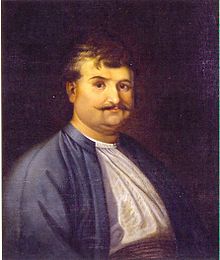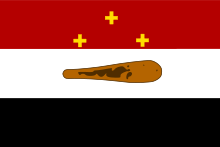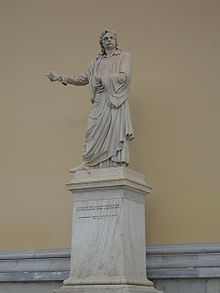- Rigas Feraios
-
Rigas
Ρήγας Φεραίος
RigasBorn Antonios Kyriazis
1757
Velestino (now Rigas Feraios (municipality)), Thessaly, Greece (then in the Ottoman Empire)Died June 13, 1798
Belgrade, Serbia (then in the Ottoman Empire)Other names Rigas Velestinlis
Constantine RigasRigas Feraios (or Rhegas Pheraeos) or Rigas Velestinlis (or Rhegas Velestinles) (Greek: Ρήγας Βελεστινλής-Φεραίος, pronounced [ˈriɣas velestinˈlis feˈreos], born Αντώνιος Κυριαζής, Antonios Kyriazis, pronounced [anˈtoɲos cirʝaˈzis]; also known as Κωνσταντίνος Ρήγας, Konstantinos or Constantine Rhigas; Serbian: Рига од Фере, Riga od Fere, [rǐːga ɔd fɛ̂rɛː]; 1757 – June 13, 1798) was a Greek writer and revolutionary, active in the Modern Greek Enlightenment, remembered as a Greek national hero, a victim of Balkan uprising against the Ottoman Empire and a forerunner of the Greek War of Independence.
Contents
Early life
Antonios Kyriazes ("Rhegas") was born in 1757 into a wealthy family in the village of Velestino, Thessaly, in Greece (then in the Ottoman Empire) - near ancient Pherae. From the ancient name of "Pherae" he was at some time given the nickname Pheraeos or Feraios, but he does not seem ever to have used this name himself. He is sometimes described as being of Aromanian ancestry, but according to Peter Mackridge "there is no sure evidence to support this".[1] He was educated at the school of Ampelakia, Larissa.
He became a teacher in the village of Kissos, and he fought the local Ottoman presence. At the age of twenty he killed an important Ottoman figure, and fled to the uplands of Mount Olympus, where he enlisted in a band of soldiers led by Spiros Zeras.
He later went to the monastic community of Mount Athos, where he was received by Cosmas, hegumen of the Vatopedi monastery; from there to Constantinople (Istanbul), where he became a secretary to the Phanariote Alexander Ypsilantis (1725-1805).
Arriving in Bucharest, the capital of Ottoman Wallachia, Rhegas returned to school, learned several languages and eventually became a clerk for the Wallachian Prince Nicholas Mavrogenes. When the Russo-Turkish War (1787-1792) broke out, he was charged with the inspection of the troops in the city of Craiova.
Here he entered into friendly relations with an Ottoman officer named Osman Pazvantoğlu, afterwards the rebellious Pasha of Vidin, whose life he saved from the vengeance of Mavrogenes. He learned about the French Revolution, and came to believe something similar could occur in the Balkans, resulting in self-determination for the Christian subjects of the Ottomans; he developed support for an uprising by meeting Greek bishops and guerrilla leaders.
After the death of his patron Rhegas returned to Bucharest to serve for some time as dragoman at the French consulate. At this time he wrote his famous Greek version of La Marseillaise, the anthem of French revolutionaries, a version familiar through Lord Byron's paraphrase as "sons of the Greeks, arise".
In Vienna
Around 1793 Rhegas went to Vienna, the capital of the Holy Roman Empire and home to a large Greek community, as part of an effort to ask the French general Napoleon Bonaparte for assistance and support. While in the city, he edited a Greek-language newspaper, Ephemeris (i.e. Daily), and published a proposed political map of Great Greece which included Constantinople and many other places, including a large number of places where Greeks were in the minority (such as Constantinople).
He printed pamphlets based on the principles of the French Revolution, including Declaration of the Rights of Man and of the Citizen and New Political Constitution of the Inhabitants of Rumeli, Asia Minor, the Islands of the Aegean, and the principalities of Moldavia and Wallachia — these he intended to distribute in an effort to stimulate a Pan-Balkan uprising against the Ottomans.
He also published Greek translations of three stories by Retif de la Bretonne and many other foreign works, and he collected his poems in a manuscript (posthumously printed in Iaşi, 1814).
Death
He entered into communication with general Napoleon Bonaparte, to whom he sent a snuff-box made of the root of a Bay Laurel taken from a ruined temple of Apollo, and eventually he set out with a view to meeting the general of the Army of Italy in Venice. While traveling there, he was betrayed by Demetrios Oikonomos Kozanites, a Greek businessman, had his papers confiscated, and was arrested at Trieste by the Austrian authorities (an ally of the Ottoman Empire, Austria was concerned the French Revolution might provoke similar upheavals in its realm and later formed the Holy Alliance).
He was handed over with his accomplices to the Ottoman governor of Belgrade, where he was imprisoned and tortured. From Belgrade, he was to be sent to Constantinople to be sentenced by Sultan Selim III. While in transit, he and his five collaborators were strangled to prevent their being rescued by Rhegas's friend Osman Pazvantoğlu. Their bodies were thrown into the Danube River.
His last words are reported as being: "I have sown a rich seed; the hour is coming when my country will reap its glorious fruits".
Ideas and legacy
Rhegas, using demotic rather than puristic Greek, aroused the patriotic fervor of his Greek contemporaries. His republicanism was given an aura of heroism by his martyrdom, and set liberation of Greece in a context of political reform. As social contraditions in Ottoman Empire grew sharper in the tumultuous Napoleonic era the most important theoretical monument of Greek republicanism, the anonymous Hellenic Nomarchy, was written, its author dedicating the work to Rigas Ferraios, who had been sacrificed for the salvation of Hellas.[2]
His grievances against the Ottoman occupation of Greece regarded its cruelty, the drafting of children between the ages of five and fifteen into military service (Devshirmeh or Paedomazoma), the administrative chaos and systematic oppression (including prohibitions on teaching Greek history or language, or even riding on horseback), the confiscation of churches and their conversion to mosques.
Rhegas wrote enthusiastic poems and books about Greek history and many became popular. One of the most famous (which he often sang in public) was the Thourios or battle-hymn (1797), in which he wrote, "It's finer to live one hour as a free man than forty years as a slave and prisoner" («Ως πότε παλικάρια να ζούμε στα στενά…. Καλύτερα μίας ώρας ελεύθερη ζωή παρά σαράντα χρόνια σκλαβιά και φυλακή»).
In "Thourios" he urged the Greeks (Romioi) and other orthodox Christian peoples living at the time in the general area of Greece (Arvanites, Bulgarians, etc.[3][4]) to leave the Ottoman-occupied towns for the mountains, where they might experience more freedom.
It is noteworthy that the word "Greek" or "Hellene" is not mentioned in "Thourios"; instead, Greek-speaking populations in the area of Greece are still referred to as "Romioi" (i.e. Romans, citizens of the Christian or Eastern Roman Empire), which is the name that they proudly used for themselves at that time.[5]
Statues of Rigas Feraios stand at the entrance to the University of Athens and in Belgrade at the beginning of the street that bears his name (Ulica Rige od Fere).
Rigas Feraios was also the name taken by the youth wing of the Communist Party of Greece (Interior), and a branch of this youth wing was Rigas Feraios - Second Panhellenic. But there is nothing in Rigas's own writings that supports Communism, as his political vision was influenced by the French Constitution (i.e. democratic liberalism) [6][7][8] Rather, use of his name indicates the Communists' aspiration to link themselves with the heroic past of Greek Nationalism.
Feraios' portrait was printed on the obverse of the Greek 200-drachmas banknote of 1996-2001.[9] A 50-drachmas commemorative coin was issued in 1998 for the 200th anniversary of his death.[10] His image is stamped on the 0.10 Euro Greek coin.
In popular culture
Nikos Xydakis and Manolis Rasoulis wrote a song called Etsi pou les, Riga Feraio (That's how it is, Rigas Feraios, Greek: Έτσι που λες, Ρήγα Φεραίο), which was sung by Rasoulis himself. Also, composer Christos Leontis wrote music based upon the lyrics of "Thourio" and Cretan Nikos Xylouris performed the song in 1970s.
Further reading
- Rhegas, 'Ellenice Democratia' (1797; repr. 1971)
- Rhegas, 'Scholeion ton delicaton eraston' (1790; repr. 1971)
Notes
- ^ Peter Mackridge, Aspects of language and identity in the Greek peninsula since the eighteenth century, The Newsletter of the Society Farsarotul, Volume XXI & XXII, Issues 1 & 2
- ^ Kitromilides, Paschalis M. (2011). "From Republican Patriotism to National Sentiment: A Reading of Hellenic Nomarchy" (PDF). European Journal of Political Theory 5 (1): 50–60. doi:10.1177/1474885106059064. ISSN 1474-8851. http://ept.sagepub.com/content/5/1/50. Retrieved 2011-02-05.
- ^ [1] Thourios Translation to English
- ^ [2] Article on Thourios and the modern Greek ethnicity
- ^ Greeks#Modern
- ^ [3] Rigas Feraios
- ^ [4] A concise history of Greece
- ^ [5] Another Rigas Feraios bio
- ^ Bank of Greece. Drachma Banknotes & Coins: 200 drachmas. – Retrieved on 27 March 2009.
- ^ Bank of Greece. Drachma Banknotes & Coins: 50 drachmas. – Retrieved on 27 March 2009.
References
 This article incorporates text from a publication now in the public domain: Chisholm, Hugh, ed (1911). Encyclopædia Britannica (11th ed.). Cambridge University Press. In turn, it cites as references:
This article incorporates text from a publication now in the public domain: Chisholm, Hugh, ed (1911). Encyclopædia Britannica (11th ed.). Cambridge University Press. In turn, it cites as references:
- Gianni A. Papadrianou, Ο Ρήγας Βελεστινλής και οι Βαλκανικοί λαοί ("Rigas Velestinlis and the Balkan peoples").
- Woodhouse, C. M. (1995). Rhigas Velestinlis: The Proto-martyr of the Greek Revolution. Denise Harvey. ISBN 9607120094.
External links
- Scanned original draft of the New Political Constitution from the collection of the Hellenic Parliament\
- Collection of papers dedicated to Rigas Charta, e-Perimetron, Vol. 3, No.3, 2008
- Nebojša Tower will become a historical monument
- Chalcography of Alexander the Great by Rigas Feraios,Vienna 1797
- History of Modern Greek Literature by C. T. Dimaras
 Chisholm, Hugh, ed (1911). "Rhigas, Constantine". Encyclopædia Britannica (11th ed.). Cambridge University Press.
Chisholm, Hugh, ed (1911). "Rhigas, Constantine". Encyclopædia Britannica (11th ed.). Cambridge University Press.
Figures in the Age of Enlightenment by country or region Notable figures America (English) America (Latin) England Edward Gibbon · Thomas Hobbes · Samuel Johnson · Edmund Burke (Irish born) · John Locke · Isaac Newton · Robert WalpoleFrance Germany Greece Hungary Italy Low Countries Poland-Lithuania Portugal Romanian States Russia Scandinavia Scotland Serbia Spain Ukraine Related topics Modern Greek Enlightenment Publications Geographia Neoteriki • Hellenic Nomarchy • Ephimeris • Hermes o Logios
Academies Ottoman Empire: Athonite Academy • Evangelical School • Kaplaneios • Maroutsaia • New Academy • Phanar Greek Orthodox College • Phrontisterion of Trapezous
Diaspora: Flanginian School • Princely Academy of Bucharest • Princely Academy of IaşiRepresentatives Cosmas of Aetolia • Rigas Feraios • Anthimos Gazis • Theophilos Kairis • Dimitrios Katartzis • Theodore Kavalliotis • Grigorios Konstantas • Adamantios Korais • Veniamin Lesvios (fr) • Iosipos Moisiodax • Daniel Philippidis • Athanasios Psalidas • Eugenios Voulgaris • Nikephoros Theotokis • Athanasios Stageiritis • Kosmas Balanos • Methodios Anthrakites • Neophytos Doukas • Balanos Vasilopoulos
Categories:- Modern Greek Enlightenment
- 1757 births
- 1798 deaths
- People from Rigas Feraios (municipality)
- History of Belgrade
- Dragomans
- Greek journalists
- Modern Greek poets
- Greek revolutionaries
- Assassinated activists
- Murdered writers
Wikimedia Foundation. 2010.



